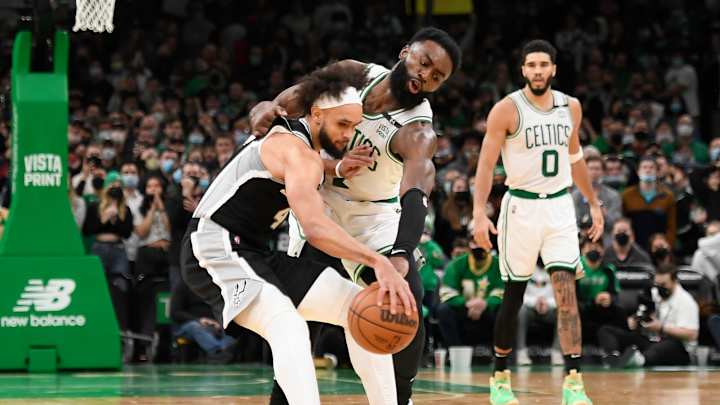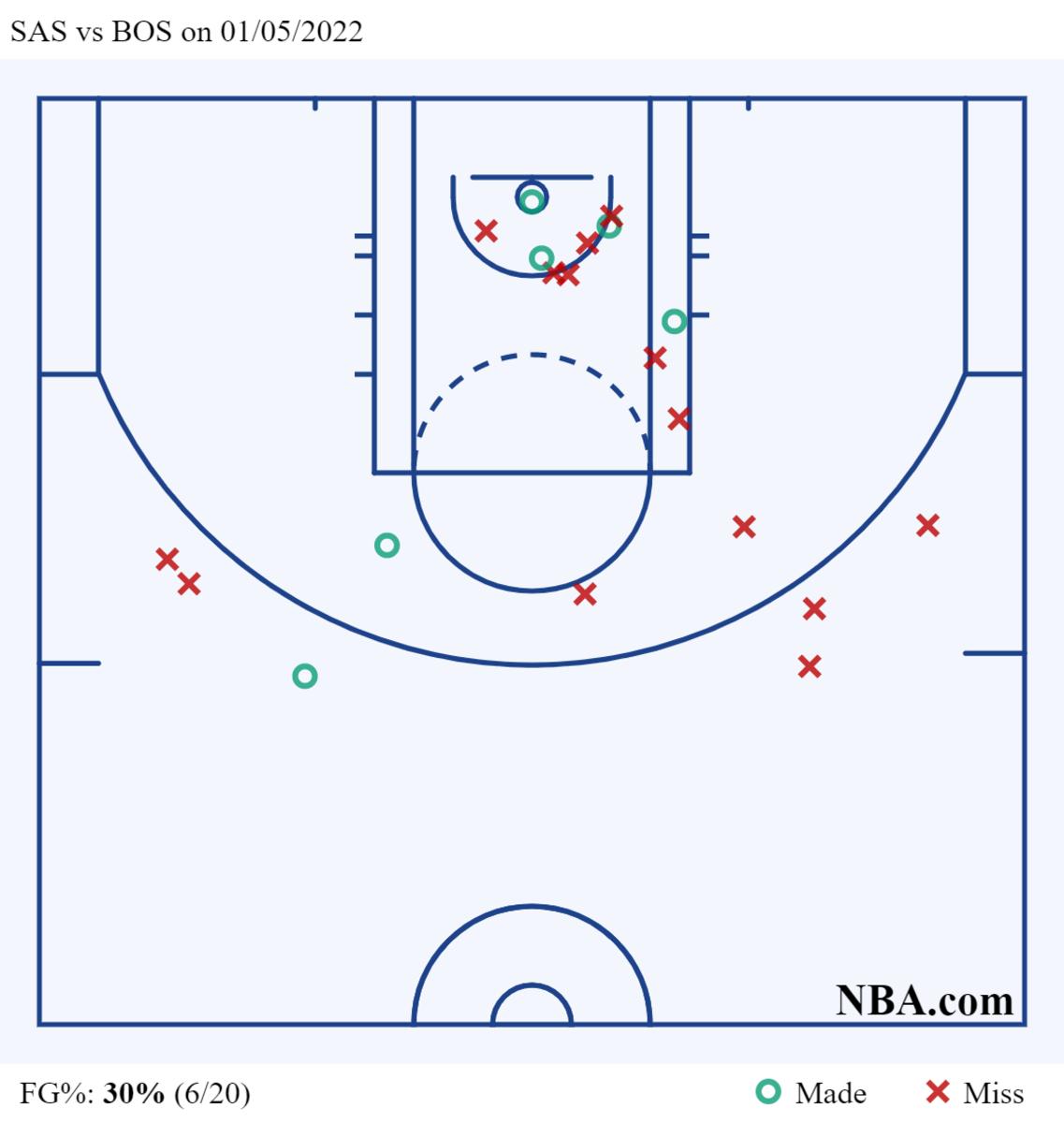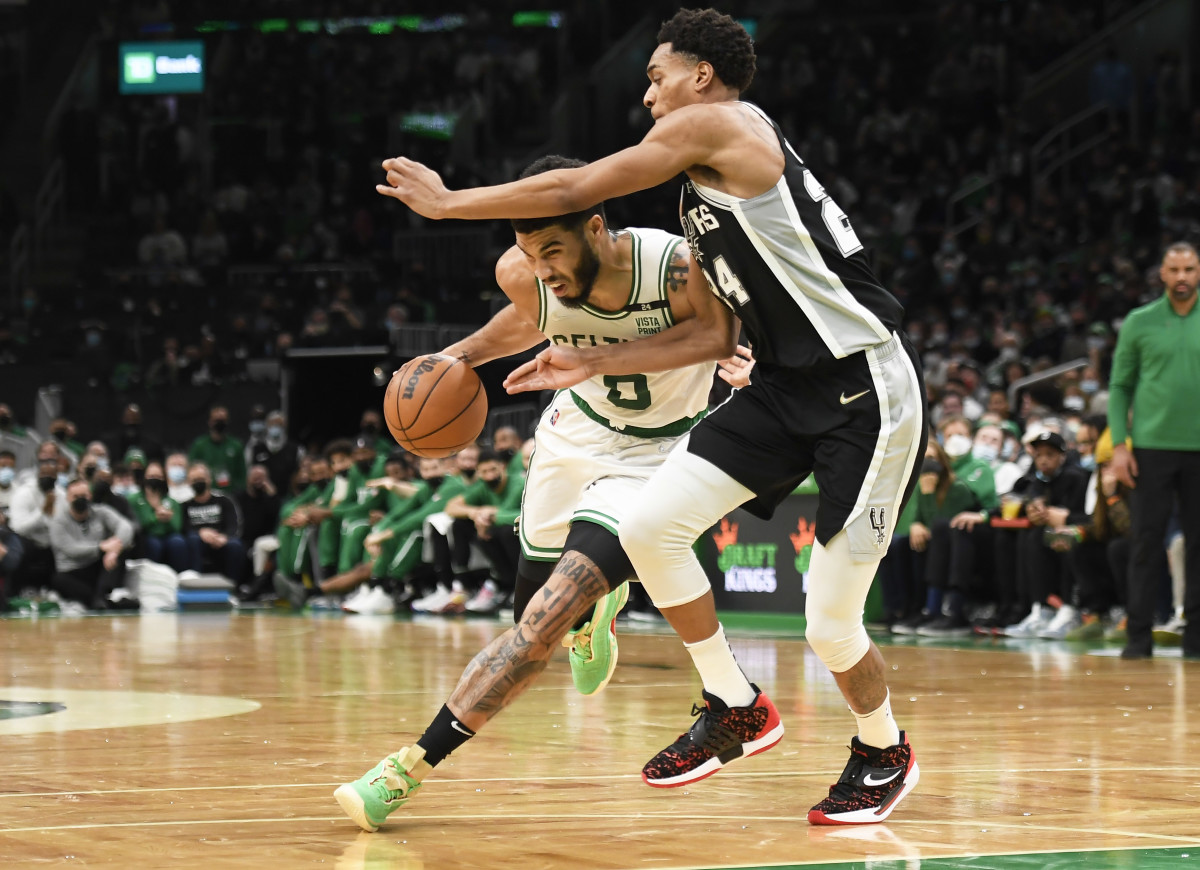What Stood Out in Celtics' Loss to Spurs: Despite Knowing Better, Boston Banks on Iso Offense

With Jayson Tatum and Robert Williams back in the lineup, one would think that holding the San Antonio Spurs to 99 points would be enough for the Boston Celtics to earn their third-straight victory, alas that wasn't the case.
Here's an exploration of what stood out on a night where familiar problems plagued Boston's offense, and defensively, the team was often a step slow.
Jayson Tatum Rusty in His Return
In his first game back after missing the last four while in health and safety protocols and then building up his stamina in preparation for his return to the hardwood, Jayson Tatum, understandably, had some rust to shake off.
Tatum finished with 19 points on 6/20 shooting, including 1/6 from beyond the arc. His shot wasn't falling, but he made a concerted effort to attack the basket, and most of his field goals came in the restricted area. That led to Tatum taking and making six free throws.

The All-Star wing also grabbed eight rebounds, dished out three assists, and swatted two shots. However, in the second half, his facilitating disappeared. Also, he was consistently a step slow defensively, getting beat off the dribble after multiple closeouts, including on a baseline drive by Keita Bates-Diop, where he attacked off the catch, leaving Tatum in his wake en route to a dunk early in the fourth quarter.
Tatum finished the loss with a game-worst plus-minus rating of -9.
The Celtics Were Slow Defensively
Tatum's a good defender, who usually doesn't get taken off the dribble, and with all due respect to Bates-Diop, especially not by someone averaging less than six points per game. His defensive struggles were the product of him getting reacclimated.
But as a unit, Boston was often a step behind as well, due to not reading and reacting quickly enough and staying locked in for the duration of possessions. Though there were plenty of open shots the Spurs didn't convert, they still knocked down 47.7 percent of their field-goal attempts, including 10/26 (38.5 percent) of their threes. They also took full advantage of the Celtics' willingness to switch their big men onto Dejounte Murray, who consistently made them pay for that decision en route to a team-high 22 points.
Despite Knowing Better, the Celtics Relied Too Heavily on Isolation Offense

In the first half, the Celtics assisted on 12 of their 23 made field goals. Assists don't always tell an accurate story about how effectively a team moved the ball; while Boston wasn't doing so at a level that resembled the 2014 Spurs, it was a significant factor in the team shooting 48.9 percent from the field in the first two quarters.
However, in the second half, it was a different story. There was a lack of activity on and off the ball. The Celtics often regressed to playing isolation basketball while most of the players on the court wearing a white jersey were stationary.
Credit the Spurs for making life difficult on Boston offensively, including a sequence where Derrick White locked down Tatum, then stripped him as he rose to shoot, and followed that up with a charge in transition against Jaylen Brown. Those stops came on two of the Celtics' last possessions of the game while San Antonio was clinging to a two-point lead.
However, offensively, the Celtics needed to challenge the Spurs more than they did in the second half, a problem that extends beyond Wednesday's game.
Their approach led to them shooting a paltry 39.5 percent from the field, including 3/11 (27.3 percent) from beyond the arc in the second half. In the final frame, Boston shot 10/23 (43.5 percent) from the floor, including 0/2 from three and 4/8 in and around the restricted area; in that time, the Celtics didn't attempt a free throw and had only three assists. And even though the Spurs helped Boston's cause with seven fourth-quarter turnovers, it led to no points for the Celtics, including, most painfully, when Jaylen Brown, as he put it afterward, "smoked" the game-tying layup at the buzzer.
Brown, who, following his 50-point performance against the Orlando Magic, scored 30 in the loss to the Spurs, brought up the team's lack of activity and cohesion after the game, saying: "We struggled with movement and continuity...offensively, we've still got to figure some things out now that guys are back."
The Celtics are now 2-10 in games decided by five points or fewer. Here's what Brown had to say about their offensive struggles in crunch time when fielding a question from the Boston Globe's Gary Washburn.
"I like playing through the bigs. I like playing through Al (Horford) and Rob (Williams); those guys are great playmakers. And depending on how teams guard us, that's a way to get some better looks and some easier baskets, rather than everything having to be isolation or everything having to be a tough drive and kick. We've got to stick with that at times. Sometimes, we like having the ball in our hands, etcetera, but playing through some of those guys are good for us and good for our team."
Up Next
The Celtics take on the New York Knicks at Madison Square Garden on Thursday; tip-off is at 7:30 EST. Inside The Celtics will have content related to the game coming out before, during, and after. And follow @BobbyKrivitsky on Twitter for updates and analysis from pregame to post.
Further Reading
What Stood Out from Celtics' Come from Behind Win Over Magic
In More Ways Than One, the Celtics are in Need of a Shakeup
What Stood Out in Celtics' Victory Over Suns: Pace, Energy Fuel Boston's Best Win of the Season
Should the Celtics Trade for Buddy Hield?
